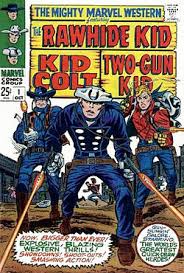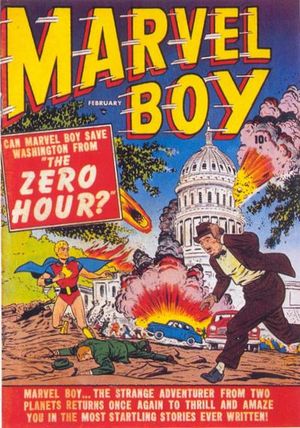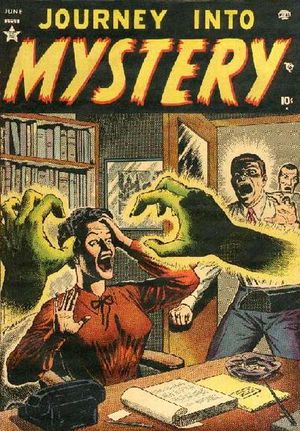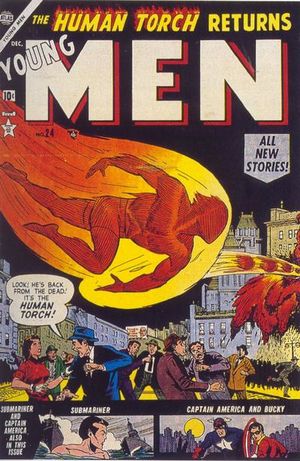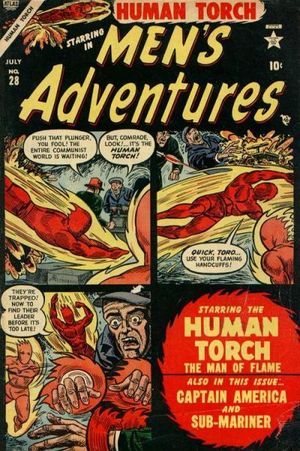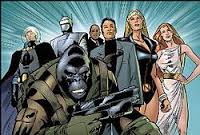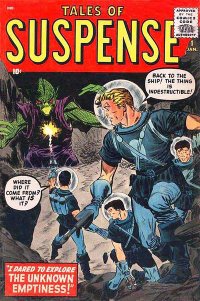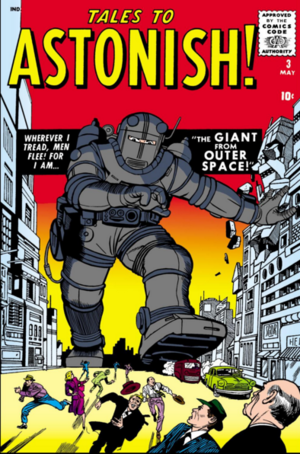Soon after the end of World War II, Timely Publications had already begun to shift its focus to c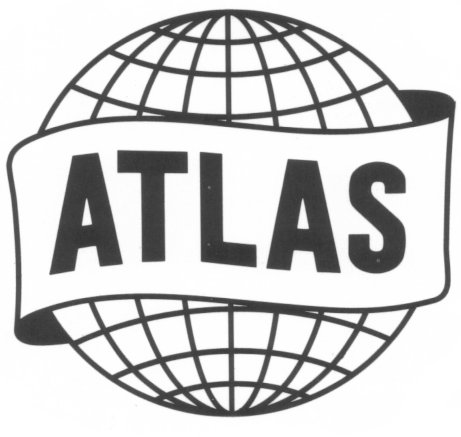 omics featuring “funny animals”, romance, western action, and several new “adolescent antics” titles (Patsy Walker, Millie the Model, Nellie the Nurse), aimed primarily at girls. The early 50s saw new emphasis on horror and crime stories, science-fiction fantasies, war stories, weird monsters, and humanity in an atomic age. These comics were distributed by Goodman’s new Atlas News Company, and the Atlas icon on their covers gave this era its name.
omics featuring “funny animals”, romance, western action, and several new “adolescent antics” titles (Patsy Walker, Millie the Model, Nellie the Nurse), aimed primarily at girls. The early 50s saw new emphasis on horror and crime stories, science-fiction fantasies, war stories, weird monsters, and humanity in an atomic age. These comics were distributed by Goodman’s new Atlas News Company, and the Atlas icon on their covers gave this era its name.
Related Events: Cold War (begins c. 1947), Senate Hearings on Delinquency (1954)
Important Terms: communism, morality tales, stigma, retrocontinuity
Discussion Points:
- How did fear of communism influence comics?
- Is your behavior influenced by what you read?
- Is government responsible for protecting us from harmful influences?
View “Comicbook Superheroes Unmasked” segment 2 (@26:00-37:00). You can also find a narrative “Brief History of the Marvel Universe” with more cover art online at http://metropolisplus.com/marvelhistory/index.htm
https://www.youtube.com/watch?v=Ygx_rUJ3XaI
Timeline
1948-51 The primary Western Heroes of the MU get their start (later stories in the “Modern Marvel” era establish these gunslingers are part of MU history):
- Two-Gun Kid and Kid Colt (both start in 1948); Rawhide Kid (1955)
- Apache Kid (1951; renamed Western Gunfighters in 1956)
1950 The only Atlas-era “superhero,” Marvel Boy, (who had grown up on Uranus!) first appeared in his own comic (title changed to Astonishing with issue #3). H After a year as something of a romance comic, stories of Greek goddess-turned-heroine Venus shift to horror themes.
1951-52 The first issues of Strange Tales and Journey into Mystery published. These titles and others from the Atlas Era will serve as launch publications for many of Marvel’s classic heroes of the 60s.
1953-55 Timely’s Golden Age “Big 3” briefly returned in Young Men #24-28, Men’s Adventures #27-28, Human Torch #36-38, Sub-Mariner # 33-43, and Captain America #76-78.
1954 Dr. Fredric Wertham’s Seduction of the Innocent published; Comics Code Authority formed after the U. S. Senate’s Hearings on Juvenile Delinquency (see details in the video).
Adventurer Ken Hale is cursed to become the Gorilla Man in a story in Men’s Adventures #26. M-11, the Human Robot, first appeared in Menace #11.
1956 F.B.I.Agent Jimmy Woo first appears in Yellow Claw #1. Two years later, Woo would become the leaders of a group of Atlas Era characters (Venus, Marvel Boy, Gorilla Man, M-11) as the Agents of Atlas.* A cousin of the Sub-Mariner, Namora, who appeared in many Golden Age stories and three issues of her own title in 1949, also was a member of the team.
1959 The first issues of Tales to Astonish and Tales of Suspense published (also important “launch” titles for Marvel’s 60s superhero revival).
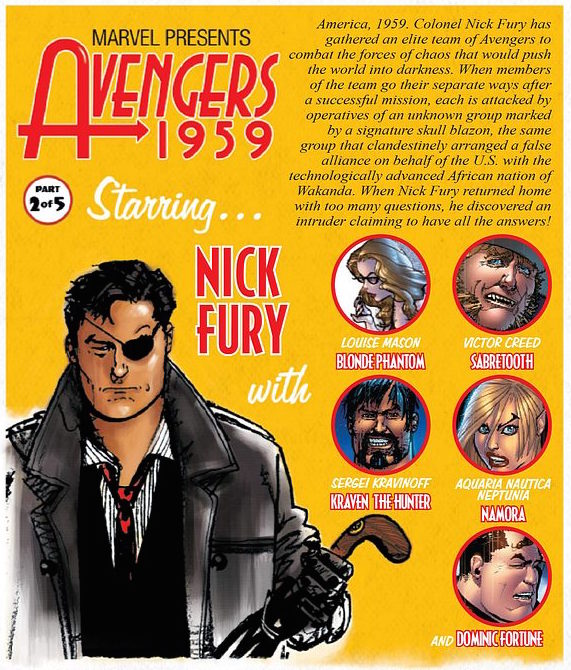 WWII hero Nick Fury assembled a group of individuals to investigate resurgent Nazi activities around the world. Calling themselves the “Avengers,” the group consisted of Golden Age heroines Blond Phantom and Namora along with “modern” characters Ulysses Bloodstone, Dominic Fortune, Kraven, Sabertooth, and the original Silver Sable.*
WWII hero Nick Fury assembled a group of individuals to investigate resurgent Nazi activities around the world. Calling themselves the “Avengers,” the group consisted of Golden Age heroines Blond Phantom and Namora along with “modern” characters Ulysses Bloodstone, Dominic Fortune, Kraven, Sabertooth, and the original Silver Sable.*
*Denotes “retrocontinuity” stories published after Marvel’s Silver-Age super-hero revival, but set prior to the events in Fantastic Four #1 (below). Marvel has made great use over the years of the art of character “retconning,” a device used to make creative changes to past stories (or in entirely new stories) to “retroactively” place them into established Marvel Universe “continuity.” Agents of Atlas first first appeared in their own series in 2006. Fury’s “1959 Avengers” appeared in New Avengers vol. 2 #10 and in Avengers 1959 (both 2011).
Up Next: The “Modern Marvel Universe” is born!

